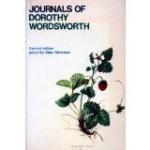|
This section contains 9,699 words (approx. 33 pages at 300 words per page) |

|
SOURCE: McGavran, James Holt, Jr. “Dorothy Wordsworth's Journals: Putting Herself Down.” In The Private Self: Theory and Practice of Women's Autobiographical Writings, edited by Shari Benstock, pp. 230-53. Chapel Hill: The University of North Carolina Press, 1988.
In the following essay, portions of which were presented in 1982, McGavran explores William Wordsworth's impact on Dorothy's perceptions and representations, especially of herself.
The “beauteous forms” of the Wye valley, which William Wordsworth simultaneously describes, remembers, and idealizes for his sister Dorothy in “Tintern Abbey,” enable him through sense, emotion, and thought—blood, heart, and mind (28-29)—to discover the enlarged, powerful self, the “living soul” that can reciprocally “see into the life of things” (46, 49) and subsequently record its vision in poetry. No longer is the external world “a landscape to a blind man's eye” (24); indeed, “All which we behold / Is full of blessings” (133-34), he assures her, thus further emphasizing the...
|
This section contains 9,699 words (approx. 33 pages at 300 words per page) |

|


